Understanding Serato Studio: Is It Free and Features?
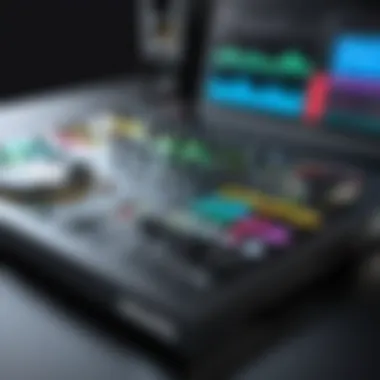
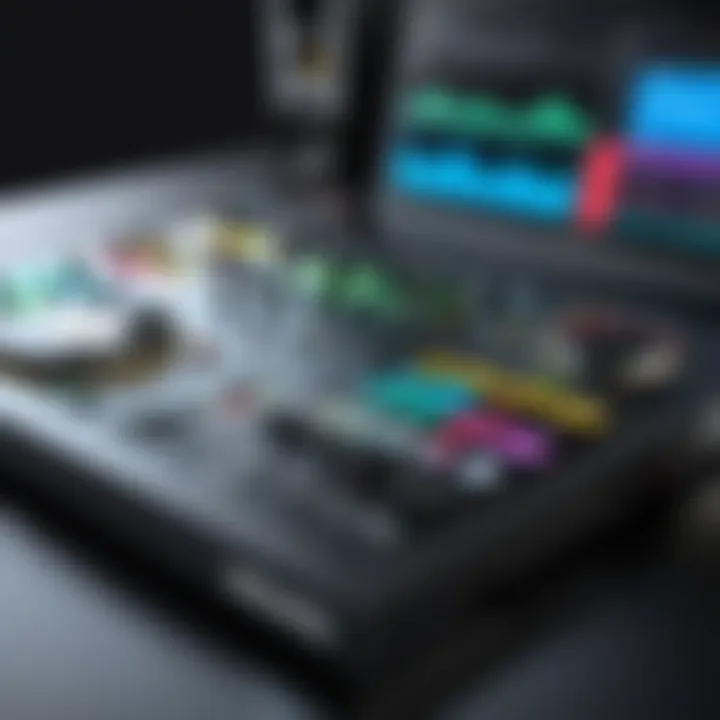
Intro
In the ever-evolving landscape of music production software, Serato Studio emerges as a notable player. This application has garnered attention, especially from beginners and professionals in the music creation scene. Understanding whether Serato Studio is free involves delving into its features, user interface, and overall value proposition. This article aims to illuminate these aspects, focusing on its strong points as well as the intricacies of its pricing.
Key Features and Functionalities
Comprehensive Overview
Serato Studio stands out with a plethora of tools tailored for music producers and DJs. It offers a user-friendly interface that simplifies the music-making process. Among its key features:
- Beat-making tool: Enables rapid creation of beats with sample packs.
- MIDI functionality: Allows users to manipulate MIDI tracks easily, fostering creativity.
- Integration with Serato DJ: Facilitates seamless transitions between music creation and live performances.
- Audio effects: Includes various audio effects to enhance sound quality and creativity.
- Sample library: Access to an extensive library provides inspiration for users.
These features streamline the workflow for both novices and experienced users alike, promoting a smooth production experience.
Target Users
The application targets a broad audience, but primarily ideal for:
- Beginners looking for intuitive software to start their music production journey.
- DJs who want to create and remix tracks efficiently.
- Seasoned producers in need of a clean, accessible tool for rapid creation.
This inclusivity makes Serato Studio an attractive option in a market filled with complex software solutions.
Pricing Models and Cost Analysis
Breakdown of Pricing Tiers
Serato Studio operates on a tiered pricing model. It offers:
- Free version: Basic features available with some restrictions.
- Paid subscription: Unlocks more advanced features, including a more extensive sample library and access to updates.
This tier system allows users to gauge the software's suitability before committing to financial investment.
Additional Costs to Consider
While the initial cost of entry might seem low, users should consider potential additional expenses:
- Sample packs: Although many samples are included, additional packs can enhance creativity but come at a cost.
- Upgrades: Depending on the version chosen, users might need to pay for future updates, which could influence overall expenses.
Understanding these elements can aid in forming a comprehensive view of the software's financial implications.
"Evaluating the total cost of ownership is critical, particularly in software that evolves rapidly like Serato Studio."
This article aims to outline the necessary knowledge for making informed decisions regarding Serato Studio, emphasizing the essential balance between free access and advanced functionalities.
Prolusion to Serato Studio
In the world of music production, software tools play a vital role. Serato Studio stands out as a noteworthy option for both beginners and seasoned professionals. Understanding its functionalities and the value it offers is crucial for anyone considering incorporating it into their workflow. This section aims to unravel what Serato Studio is and how it can benefit music creators.
What is Serato Studio?
Serato Studio is a digital audio workstation (DAW) designed primarily for music production. Launched by Serato, a well-known name in the music software industry, this application caters particularly to DJs and producers. One of its key features is its user-friendly interface, which allows users to create tracks quickly and efficiently, without requiring extensive experience in music production.
The software supports various audio formats and provides tools for beat making, sample manipulation, and arrangement. Additionally, it offers integrated features that enable seamless connectivity with other Serato products, such as Serato DJ. Users can expect a platform that streamlines the music creation process while maintaining a high level of control over their projects.
Purpose and Use Cases


The purpose of Serato Studio extends beyond simple music production. It serves as an entry point for those new to music making while also providing advanced tools that experienced producers can leverage. Key use cases include:
- Beat Making: Users can create beats from scratch or manipulate existing samples.
- Live Performance: Integration with DJ software allows for live mixing and performance enhancements.
- Genre Versatility: The software caters to various genres, making it suitable for hip-hop, electronic, and more.
- Rapid Prototyping: The intuitive layout allows for quick experimentation with musical ideas.
Exploring the Cost Structure
Understanding the cost structure of Serato Studio is crucial for anyone considering the software for music production. The financial implications of utilizing such a tool can significantly shape one's decision to invest time and money into it. In this section, we delve into the primary questions surrounding its pricing, helping potential users understand if the investment aligns with their needs and budget.
Is Serato Studio Free?
Serato Studio presents a blend of accessibility and premium options when it comes to its pricing. Below is a comprehensive look at whether or not users can access the software without financial commitment.
Serato Studio offers a free trial, which allows potential users to explore its features without an immediate investment. This approach enables individuals to evaluate the software’s capabilities and determine if it meets their production expectations. However, it’s essential to note that the free trial is limited. After the trial period concludes, continued use of the software requires a paid subscription or one-time purchase.
Many users appreciate this trial option as it provides a tangible way to experience the software before committing. But for those who prefer free options, the initial trial may fall short. The reality is, most robust digital audio workstations (DAWs) are rarely entirely free, and Serato Studio maintains this norm.
In short, no, Serato Studio is not free for long-term use, but it does provide an opportunity for users to experience it without charge for a limited time.
Pricing Tiers and Options
When exploring Serato Studio’s pricing, it’s essential to understand the different tiers available. This software comes with multiple options, catering to diverse needs among producers. The typical tiered structure gives users flexibility according to their budget and use case.
Serato Studio generally offers a subscription model alongside a one-time purchase. The subscription allows users to access updates and support continuously, providing ongoing value over time. Conversely, a one-time purchase could suit those who prefer to invest upfront and avoid recurring fees.
Here is a breakdown of the pricing details to consider:
- Subscription Model:
- One-Time Purchase:
- Monthly: Provides flexibility for short-term projects or those new to the software.
- Annual: A cost-effective option for serious users who intend to use Serato Studio extensively.
- A single payment that grants lifetime access to the software, excluding major updates that may require an additional purchase in the future.
Ultimately, the choice between subscription and one-time options hinges on individual preferences, project needs, and budget constraints. Weighing these factors will guide potential users toward the most suitable financial decision.
Features and Capabilities
The section about features and capabilities is essential for understanding what Serato Studio provides to its users. Features are not just add-ons; they define the usability and strength of any software. For potential users, comprehension of these aspects is crucial in determining if the tool suits their needs for music production or DJing.
Serato Studio, a software designed with performers in mind, brings a suite of tools that cater specifically to music production. The capabilities range from basic beat making to more advanced functionalities that support live performance and sound manipulation. This section will offer a detailed look at both core features and advanced functionalities, which will assist users in making informed decisions.
Overview of Core Features
Serato Studio's core features lay the foundation for its use in music production. These elements include a user-friendly interface, an intuitive workflow, and robust audio editing tools. Some key features are:
- Sample Library: Users have access to a vast library of samples. This enhances creativity, allowing users to experiment with various sounds.
- Beat Maker: The beat-making functionality is straightforward, making it accessible to beginners. Even experienced producers can benefit from its efficiency.
- Integrated Effects: Built-in effects ensure that producers can shape their sounds creatively without needing third-party plugins.
- MIDI Capability: The software supports MIDI, allowing for greater flexibility in production and playability with external MIDI devices.
- Export Options: The ability to export projects in different formats makes sharing and collaboration straightforward.
Understanding the core features helps users leverage these tools effectively, ultimately enhancing their music production experience.
Advanced Functionality for Producers
Beyond the core features, Serato Studio offers several advanced functionalities that set it apart from other software in the market. These enhancements cater specifically to more experienced users looking to elevate their productions. Notable advanced features include:
- Automation: Users can automate various parameters. This can greatly enhance creative expression in productions by allowing dynamic changes throughout a track.
- External Plugin Support: The ability to integrate VST and AU plugins expands the sound design possibilities, enabling users to incorporate unique sounds and effects into their projects.
- Live Performance Tools: Features tailored for live performance allow DJs to create and manipulate tracks on the fly, which is essential in a performance setting.
- Collaborative Features: Serato Studio includes options for collaboration. This supports sharing projects with other artists, streamlining the collaborative process.
As with any advanced functionality, the learning curve is present. However, the benefits are significant for producers willing to invest time in mastering these features. With these tools, creators can push their music to new artistic boundaries.
User Interface and Experience
The user interface and experience of any software significantly impact how effectively it serves its intended purpose. For Serato Studio, a platform designed primarily for music production, the UI must be intuitive, allowing users to focus on creativity rather than struggling with navigation or functionality. A well-designed interface encourages productivity, minimizes frustration, and most importantly, enables users to execute their artistic visions with clarity and efficiency.
Design Elements of Serato Studio
The design of Serato Studio incorporates several key elements that enhance usability.
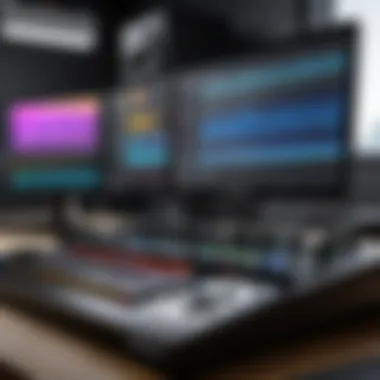
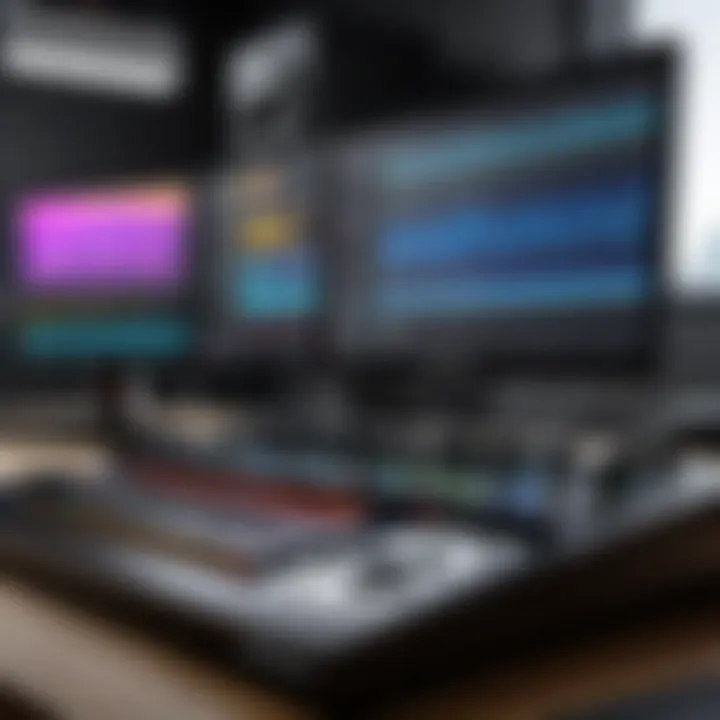
- Visual Layout: The placement of controls is thoughtfully structured, ensuring that important features are easily accessible. A clean and organized layout helps prevent users from feeling overwhelmed.
- Color Scheme: Colors used in the application are not just aesthetically pleasing; they also serve a functional purpose. Subtle contrasts highlight essential buttons and feedback elements, guiding user attention appropriately.
- Icons and Graphics: Icons in Serato Studio are straightforward and represent their functions clearly. This is crucial for users who may not be familiar with every tool available. Visual representation allows for quicker learning and memorization of features.
In addition to the visual aspects, Serato Studio prioritizes responsiveness. Users can expect smooth interactions; this is vital in a music production environment where timing is critical.
Navigating the Workspace
Navigating the workspace in Serato Studio is designed to feel natural, which is especially important for both novices and experienced music producers. The organization of tools is logical, which significantly reduces the learning curve. Understanding how to find and use the various features is crucial for maximizing productivity.
- Main Dashboard: At the heart of Serato Studio is the main dashboard, which presents a comprehensive view of the current project. Here, users can access all primary functions such as track organization, sound libraries, and effects. The dashboard's layout facilitates a quick overview, allowing users to switch between tasks without losing focus.
- Toolbars and Menus: Toolbars contain essential functions for quick access. Menus are categorized to simplify selection processes. This categorization helps users locate the desired tool swiftly, enhancing flow during creative sessions.
- Shortcut Options: For seasoned users, keyboard shortcuts can be game-changing. Serato Studio offers customizable shortcut settings, allowing workflow optimization according to personal preferences.
"A streamlined interface fosters creativity, enabling artists to focus on crafting their sound rather than wrestling with the technology."
Ultimately, a well-crafted user experience can elevate the overall productivity and satisfaction in the creative process.
Community Insights
Community insights are crucial for understanding the real-world applications and limitations of software like Serato Studio. In a crowded market, user experiences can provide essential information that goes beyond the marketing narrative. They serve as a reflection of the software's effectiveness, usability, and overall satisfaction among its target audience. Analyzing user feedback reveals both strengths and weaknesses of Serato Studio, which can greatly influence the decision-making process for potential users. Companies that actively engage with their communities often benefit from increased loyalty and trust, making these insights an invaluable part of the product's ecosystem.
User Reviews and Testimonials
User reviews and testimonials form the backbone of community insights for Serato Studio. They offer potential users a glimpse into what they can expect from the software based on real experiences. Positive reviews frequently highlight the intuitive design of the interface, allowing both novice and seasoned producers to navigate the tools effectively. Users often praise the extensive library of samples, loops, and built-in effects that enhances their creative projects. However, not all feedback is favorable. Some users have voiced concerns regarding certain limitations, such as the availability of advanced features compared to other Digital Audio Workstations like Ableton Live or FL Studio. This mixed feedback can serve as an eye-opener for those scraping the surface, urging them to conduct further investigation.
"Serato Studio’s ease of use is impressive. But, the limited advanced features can be a bottleneck for serious producers, taking time to adapt when transitioning to more robust DAWs." - User Feedback
Common Challenges Identified by Users
Despite its strengths, Serato Studio does face challenges that users commonly identify. One prevalent issue is the learning curve associated with mastering some features. Although designed with simplicity in mind, new users sometimes feel overwhelmed when attempting to utilize all the tools effectively. Some users have reported bugs in the software, leading to occasional crashes during projects. This issue compromises workflow efficiency and can be frustrating, particularly during live performances.
Furthermore, limited options for plugin compatibility can hinder users looking to exploit their existing library of VST plugins. This may restrict creative workflows for seasoned producers who rely on specific tools for their sound design. Being aware of these challenges helps potential users make an informed decision, balancing the software’s advantages against any possible drawbacks.
Competitors in the Market
Analyzing the competitive landscape is critical when considering any software, including Serato Studio. Understanding how it stacks up against other digital audio workstations (DAWs) can help potential users make informed decisions. With multiple options available, users can assess features, pricing, and overall value relative to their specific needs. A thorough comparative analysis allows for the recognition of both strengths and weaknesses within Serato Studio itself and its competitors.
Comparative Analysis with Other DAWs
When we contrast Serato Studio with other DAWs like Ableton Live, FL Studio, and Logic Pro X, several factors arise. Each of these platforms has unique strengths. For instance, Ableton Live is often praised for its session view, which is ideal for live performances. On the other hand, FL Studio is known for its intuitive interface and pattern-based music production, making it a favorite for electronic musicians.
Logic Pro X is a powerful tool favored by recording artists for its extensive library of sounds and plugins. In contrast, Serato Studio tends to focus more on the needs of DJs and music producers who prioritize beat-making and audio manipulation in a straightforward manner. This special focus can be appealing for those whose work revolves around specific genres like hip-hop and electronic dance music.
Additionally, many users value workflow efficiency. Serato Studio offers a more streamlined process for creating beats. It has a user-friendly interface that speeds up the workflow. This can be a significant advantage for those who may feel overwhelmed by the complexity of other DAWs.
Unique Selling Points of Serato Studio
Serato Studio boasts several unique selling points that differentiate it from its competitors. First, the software's integration with Serato DJ illustrates a commitment to providing seamless functionality for both DJs and producers. Users can transition their projects easily between environments, facilitating performances that blend production and live mixing.
Furthermore, its sample-based music production capabilities simplify the creative process. Features like sample triggering and automatic key detection are immensely helpful.
Additionally, Serato Studio supports a robust library of presets and sound packs that enable instant creativity without requiring extensive setups. The availability of various virtual instruments makes it easy to begin composing right away, which can greatly benefit novice and experienced musicians alike.
In terms of accessibility, Serato Studio prioritizes novice users, allowing them to engage quickly without an extensive learning curve. The focus on immediate creativity rather than intricate configurations can attract many individuals looking for a straightforward tool for music production.
"Serato Studio's unique blend of DJ-oriented features and ease of use makes it a compelling choice for many in the music production scene."
Ultimately, considering the factors mentioned earlier allows potential users to make educated choices based on their specific needs and the features they prioritize in music production.
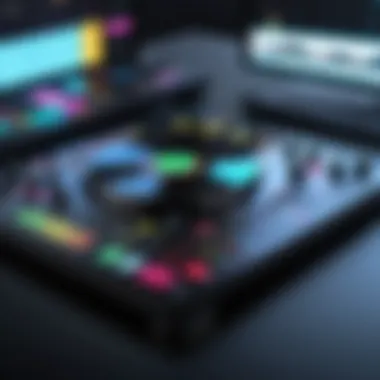
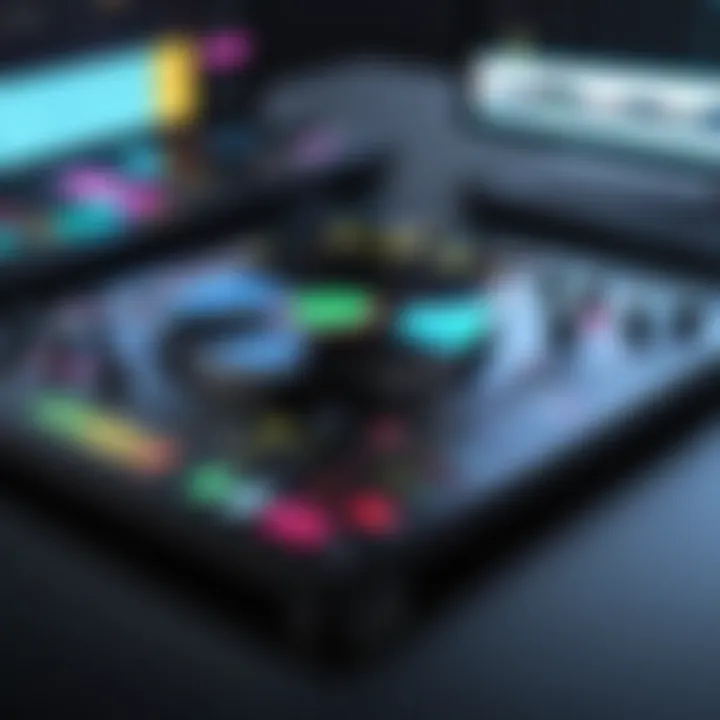
Updates and Support
Updates and support are critical components for any software, and Serato Studio is no exception. As music production software evolves, regular updates ensure that users benefit from the latest features, bug fixes, and improvements in performance. Effective support mechanisms are equally essential to address user concerns, troubleshoot issues, and optimize the overall experience. Without these elements, even the most sophisticated application may falter in terms of user satisfaction and functionality.
Frequency of Software Updates
The frequency of software updates for Serato Studio can significantly impact its usability and performance. Regular updates keep the software aligned with current industry standards, introduce new functionalities, and resolve potential bugs that might affect workflow. Users can expect updates at least quarterly, although major versions may be released less frequently. Regular patches often focus on stability enhancements and address specific issues highlighted by the community. This methodical approach to updates creates a reliable experience for users.
New features introduced in updates often reflect feedback from users, offering a more tailored solution for music producers. This responsiveness fosters a feeling of community among users. Keeping the software current with regular updates is not merely a technical necessity; it also enhances user engagement, ensuring that the tool remains relevant in a competitive market.
Customer Support Options
Customer support for Serato Studio is multifaceted, providing users with various ways to seek help and solutions for their concerns. The help center serves as a comprehensive resource, offering FAQs, troubleshooting guides, and tutorials that can address common issues. For users needing immediate assistance, the support ticket system allows them to connect directly with customer service representatives to resolve more complex problems. This option ensures a personalized response to specific inquiries, which can be invaluable during critical production sessions.
In addition to official channels, community forums such as reddit and Facebook groups play a crucial role in the support ecosystem. Here, users can share experiences, tips, and solutions with one another, creating a sense of belonging and collaboration within the community. This dynamic allows for real-time information exchange and is often a quicker way to resolve specific queries.
Overall, an effective combination of regular updates and robust customer support will enable Serato Studio users to maximize their experience while maintaining quality and satisfaction.
Practical Applications
The section on Practical Applications is crucial as it emphasizes how digital audio workstations such as Serato Studio can be harnessed in real-world scenarios. Understanding these applications can greatly inform potential users about the software’s versatility and benefits. This segment targets decision-makers and creative professionals considering Serato Studio for their music production needs.
Serato Studio has emerged as a significant tool for musicians, producers, and DJs. Its design caters not only to studio environments but also to live performance settings. The practical use of Serato Studio can lead to improved workflow, creative possibilities, and a more engaging music experience. Furthermore, recognizing the varied contexts in which this software can fit helps users align it with their specific requirements.
Examples of Successful Projects
Many users have leveraged Serato Studio in impressive projects. These include not only independent artists but also established professionals seeking innovative solutions in music creation. For instance, unexpected collaborations and remixes have surfaced from the efficient workflow of Serato Studio.
- Remix Projects: Various DJs have utilized the software to quickly create remixes for popular songs. The streamlined user interface allows for effective sampling and sound manipulation, enabling artists to innovate while saving time.
- Original Compositions: Several producers have shared their journeys of crafting original tracks entirely within Serato Studio. The comprehensive capability of the platform enhances their creativity and allows them to focus on their artistic vision.
- Music Tutorials: Educators using Serato Studio in courses have reported substantial success. They find the software intuitive, allowing students to easily learn key concepts in music production without overwhelming technical barriers.
Integrating Serato Studio in Live Settings
Integrating Serato Studio into live settings is another compelling aspect of its applications. The ability to utilize the software in a performance context can create dynamic and exciting experiences for audiences. Here, it’s essential for artists and DJs to understand how to effectively use this tool in a live environment.
Serato Studio's live performance features are designed with flexibility in mind. Artists can quickly switch between playing pre-arranged sets and improvising new ones, with a focus on user control and creativity.
Some notable approaches include:
- Live Remixing: DJs can remix tracks on the fly, offering audiences unique interpretations of familiar songs. This capability enhances engagement and keeps the performance fresh.
- Real-Time Collaboration: Artists can collaborate live, incorporating immediate feedback into their performances. This interaction promises excitement and involvement for listeners.
- Use of Samples: The ability to load samples easily allows artists to infuse their sets with diverse sounds, elevating the audience’s experience.
Final Thoughts
The final thoughts section in this article serves a crucial role in synthesizing the insights and perspectives discussed throughout. It offers a concise evaluation of the merits and drawbacks of Serato Studio. This aids potential users in determining how well the software aligns with their needs. Evaluating the overall value of a software product is essential, especially in a competitive environment where various options exist.
In discussing Serto Studio, important factors include its cost structure, functionality, and community feedback. All these aspects combine to create a clearer picture of how this software stands in comparison to others. A thorough understanding enhances the decision-making process, allowing users to pick the right tools for their music production needs.
Evaluating the Overall Value of Serato Studio
Serato Studio offers several compelling features. However, its value varies based on users' individual circumstances. The software is designed with a focus on ease of use, making it appealing to both beginners and more seasoned producers.
When assessing its overall value, users should consider:
- Features: It includes a range of tools that simplify music creation. From sampling to beat-making, users find a comprehensive suite.
- Support and Community: A supportive community exists. This enhances users' experiences as they exchange ideas and troubleshoot issues.
- Learning Curve: The software is relatively straightforward, making it possible for new users to become proficient quickly.
- Integration with Hardware: Its compatibility with various DJ equipment is noteworthy, allowing seamless setups during live performances.
Despite these strengths, there are areas for improvement. Some users have reported limitations with certain features compared to more expensive DAWs. This discrepancy necessitates weigh carefully their needs against the available functionalities.
Who Should Consider Using It?
Serato Studio targets a broad audience but is particularly suited for specific user groups. Those who will find it most beneficial include:
- Aspiring Producers: Beginners looking for user-friendly software will appreciate its intuitive design.
- DJs: Professionals who require a program that integrates well with their performance gear will benefit from this. It can easily manage both software and hardware aspects.
- Hobbyists: Individuals interested in music production on a casual basis can find value without overwhelming complexity.
- Music Educators: Teachers aiming to introduce students to music technology may find it a fitting educational tool.
In summary, Serato Studio presents diverse opportunities for various users. However, its effectiveness will ultimately depend on the specific requirements and production goals of the individual user.















